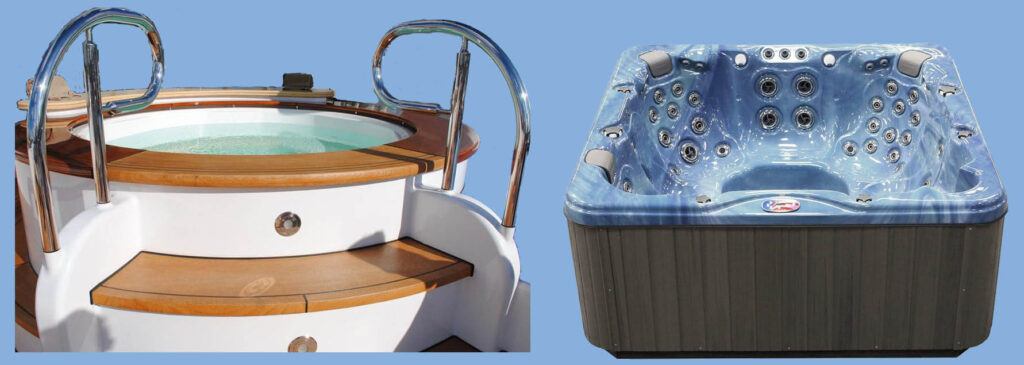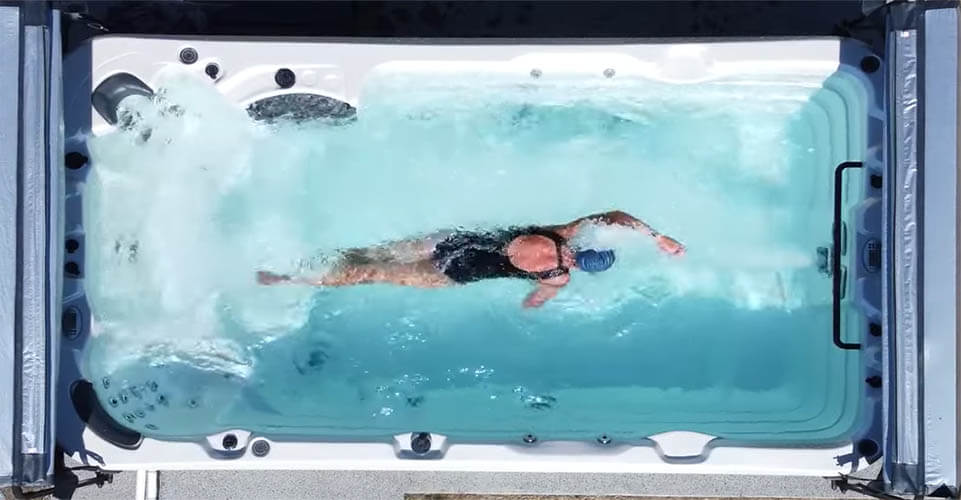
Is a Hot Tub Considered a Pool?
No, a hot tub is not considered a pool, although both are bodies of water used for recreation. Here’s a breakdown of the key differences:
- Size and Depth: Hot tubs are significantly smaller than pools. They are designed for soaking and relaxation, with seating for a few people, whereas pools are meant for swimming and can accommodate many people.
- Hot tubs are typically much smaller than pools. They’re compact and ideal for those with limited space.
- The water in a hot tub is not as deep as in a pool.
- Additionally, hot tub water is usually kept at a higher temperature than pool water.
- Water Temperature: Hot tubs maintain much hotter water than pools. While pools are refreshing on a hot day, hot tubs are meant to be soothing and therapeutic.
- Purpose: Hot tubs are primarily for relaxation and hydrotherapy, with features like massaging jets. Pools are for swimming, exercise, and leisure activities.
In short, think of a hot tub as a giant bathtub for multiple people, while a pool is a mini lake in your backyard. They both involve water but serve different purposes.
A Further Breakdown
Contents
While hot tubs and pools are both inviting bodies of water designed for human enjoyment, they serve different purposes and are seen in different lights. Pools, generally speaking, are larger bodies of water designed for swimming, playing, and exercise. They’re the go-to for cooling off on a hot summer day or for hosting a lively pool party.
Hot tubs, on the other hand, are smaller, warmer, and more intimate. They’re designed for soaking, relaxation, and hydrotherapy. With their jets and higher temperatures, hot tubs offer a cozy escape where you can unwind and soothe your muscles. It’s like comparing a refreshing outdoor shower to a relaxing indoor spa session.
So, is a hot tub a pool? Technically, no. Hot tubs aren’t considered pools. The main differences lie in their intended use, size, water temperature, and maintenance needs. That said, both hot tubs and pools can boost your home’s value, offer endless family fun, and become the centerpiece of your outdoor living space.
When you think about adding either to your home, consider what fits your lifestyle and budget. Do you dream of leisurely swims and poolside barbecues, or does the thought of a therapeutic soak under the stars appeal more to you? Either way, both pools and hot tubs can provide a wonderful backdrop for making memories and enjoying the comforts of home.
What About a Swim Spa?

Swim spas are fascinating hybrids that blur the lines between hot tubs and pools, bringing together the best of both worlds. If you’ve ever found yourself pondering whether a swim spa could be considered a pool, you’re not alone.
A swim spa is essentially a larger version of a hot tub, equipped with powerful jets that create a continuous current against which you can swim, effectively swimming in place. They’re designed to provide the benefits of both a pool and a hot tub: the exercise and recreation of swimming combined with the therapeutic and relaxation advantages of soaking in warm water.
So, can a swim spa be considered a pool?
In some ways, yes. Swim spas can be seen as smaller pools that offer the added functionality of a hot tub. They allow for swimming, something traditionally associated with pools, but their compact size and heated water capability align more closely with hot tubs. Swim spas often come in longer lengths than traditional hot tubs, providing enough space for an adult to swim strokes effectively against the current.
Let’s wade into the details to clarify this intriguing question.
Similarities to a Pool:
- Size: Swim spas are larger than hot tubs, offering a bit more space for movement than a standard hot tub.
- Swimming: Like a pool, swim spas have features that allow you to swim in place against a current.
Similarities to a Hot Tub:
- Water Features: Similar to hot tubs, swim spas often have built-in jets for massage and hydrotherapy.
- Temperature: Swim spas can be heated to similar temperatures as hot tubs, making them usable year-round in many climates.
Key Differences:
- Size: Still significantly smaller than most pools, limiting swimming laps or large group activities.
- Cost: Generally less expensive to install and maintain than a traditional pool.
- Year-round Use: Easier to maintain comfortable water temperatures due to smaller size.
So, to directly answer your question, a swim spa wouldn’t be considered a true pool in the sense of a large, open-water swimming area. However, it offers the benefit of a small pool for exercise like swimming against a current, along with the relaxation features of a hot tub.
Cost, Space, and Comfort: Pool vs Hot Tub vs Swim Spa
Choosing between a pool, hot tub, or swim spa involves weighing the balance of cost, space, and comfort. Each option offers unique advantages and considerations. Let’s break down these aspects to help guide your decision.
Here’s a comparison of pools, hot tubs, and swim spas across three key aspects: cost, space, and comfort.
| Aspect | Pool | Hot Tub | Swim Spa |
| Cost | High initial and ongoing costs; includes excavation, construction, maintenance, safety equipment, and potential heating. | Lower initial cost than pools, varies by size/features. Ongoing costs for energy, maintenance, and water replacement. | Mid-range initial investment. Operational costs higher than hot tubs but less than pools, due to dual functionality. |
| Space | Requires significant space, suitable for larger properties. Permanent fixture that can dominate a backyard. | Flexible placement due to smaller size; can be installed on decks, patios, or indoors, suitable for limited spaces. | Needs less space than traditional pools but more than hot tubs. Versatile placement options. |
| Comfort | Excels in recreational and exercise opportunities. Customizable features for play and relaxation. | Designed for relaxation and hydrotherapy, with ergonomic seating, massage jets, and temperature control. | Combines exercise benefits of pools with relaxation features of hot tubs. Adjustable currents and temperature. |
| Comfort (Exercise) | Excellent | Poor | Moderate |
Cost
Pool: The cost of installing a pool can be quite significant, with expenses covering excavation, construction, finishing materials, and ongoing maintenance. Pools also require fencing, safety equipment, and potentially heating to extend their usable season, all of which add to the total cost. Additionally, pools typically have higher ongoing maintenance costs, including cleaning, chemical balancing, and winterization in colder climates.
Hot Tub: Hot tubs are generally less expensive to install than pools due to their smaller size and the simplicity of installation. However, the cost can vary widely based on size, features, and quality. While cheaper upfront, hot tubs still incur ongoing costs for energy (to keep the water heated), maintenance, and occasionally replacing the water.
Swim Spa: Swim spas often fall in the middle range in terms of initial investment. They provide the benefits of both a hot tub and a pool but in a smaller, more manageable package. The operational costs are typically higher than those of a hot tub but less than a full-sized pool, primarily due to their dual functionality and the need to heat a larger volume of water than a standard hot tub.
Space
Pool: Pools require a significant amount of space, making them suitable for larger properties. They are a permanent fixture that can dominate a backyard, requiring careful planning to ensure there is harmonious balance with the rest of the outdoor living area.
Hot Tub: Hot tubs offer much greater flexibility in terms of placement due to their smaller size. They can be installed in a variety of settings, including decks, patios, and even indoors, making them a viable option for those with limited outdoor space.
Swim Spa: Swim spas provide a compact alternative to traditional pools, needing less space while still allowing for an effective swimming experience. They are more versatile than full-sized pools but do require more space than a standard hot tub. Their elongated shape allows for placement in areas where a traditional pool might not fit.
Comfort
Pool: Pools excel in recreational and exercise opportunities, offering ample space for swimming, games, and relaxation. They are ideal for cooling off on hot days and can be customized with features like diving boards, slides, and shallow play areas for children.
Hot Tub: Hot tubs are designed for relaxation and hydrotherapy, with features like ergonomic seating, massage jets, and temperature control to maximize comfort. They are ideal for unwinding after a long day or soothing sore muscles.
Swim Spa: Swim spas offer the best of both worlds, providing the ability to swim against adjustable currents while also offering features for relaxation and hydrotherapy. The water temperature can be set for a comfortable swim or a warm soak, making it versatile for both exercise and relaxation.
Conclusion
Your choice between a pool, hot tub, or swim spa will depend on your priorities, space, budget, and how you envision using the feature. Pools are ideal for those with ample space and a desire for recreational swimming, hot tubs for those prioritizing relaxation in any space, and swim spas for those seeking a blend of exercise and comfort in a compact form. Each option has distinct advantages in terms of cost, space requirements, and comfort level, ensuring there’s an option suited to a wide range of needs and preferences.

